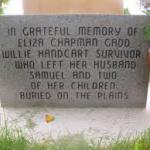For several years of my childhood, my dad farmed alfalfa and cotton outside of the tiny town of San Simon, Arizona. When I was 5, I got one of two most memorable horse rides of my life.
My dad invited me to check the irrigation with him on horseback. He swung himself into the saddle and then reached for my upstretched arms and lifted me up to share the saddle with him. Sometimes I rode behind the saddle holding on to his waist. But that day I got the front seat.
We rode through the fields, stopping to check whatever dad needed to check. Suddenly, we heard a menacing rattlesnake rattle and saw the snake coiled for action. The horse immediately lunged forward, spooked by the rattlesnake.
I’d been spooked by the rattler, too. I reacted to the snake and the horse’s reaction by screaming my fear.
My screams exacerbated the horse’s terror. He galloped faster and faster.
I’d never galloped that fast on a horse before. I had an unstable seat bouncing in front of dad and the horse’s gait exacerbated my terror. I screamed louder and louder, which increased the horses’ agitation.
You get it. The horse and I devolved into an eternal frenzied cycle absent of all rational thought. Had we been the only creatures involved, I’m sure we would have galloped and screamed uninterrupted to the tip of South America.
But, luckily, a rational creature did exist. My dad. He held the reins of his galloping horse with one hand and his screaming child in the other.
Above my clamor, I began to hear dad’s voice reasoning with me. “Delisa, your screaming is scaring the horse. If you stop screaming, I can calm him down.”
I don’t know if I believed dad or not, but apparently, I didn’t respond quickly. I soon felt dad’s gigantic hand over my mouth. With my screams muffled, I felt a shift in the horse. I began trusting. I stopped screaming and clung to the saddle horn. Dad took the reins in both hands then and gently reined in the agitated animal to a calmer pace. Then we went home.
Triggering a Breach
I’ve thought a lot about that experience in different ways at different points in my life.
Today, I realize that dad, the horse, and I experienced the same external trigger—the rattlesnake. The snake threatened our lives. We faced danger. And we all reacted differently.
The Cyclical Relationship
The horse (who I loved with all my heart, incidentally) and I became entangled in a self-interested struggle. We couldn’t see beyond the immediate. Any ability to problem solve and work together flew out the window at the first lunge and scream.
We perpetually triggered the fear and chaos in each other, even though we both ultimately wanted the same thing—peace and safety. We continued this destructive cycle even when the original danger was left far behind in the dust. Though frustrating, we both blindly participated in a course of action with a potential outcome as deadly as the rattlesnake’s bite.
The Repairer of the Breach
Dad had a different perspective and experience. He knew the immediate danger passed. He saw the horse and I suffered recklessly and needlessly. He saw our destructive course and deadly potential outcome.
Using the means at hand and our tenuous willingness, he repaired our breach.
Neill F. Marriott beautifully described how the breach is repaired in relationships in “Abiding in God and Repairing the Breach.”
Isaiah spoke of those who faithfully live the law of the fast and thus become for their own posterity a repairer of the breach. They are the ones who, Isaiah promises, will “build the old waste places.” In a similar way, the Savior repaired the breach, or distance, between us and Heavenly Father. He, through His great atoning sacrifice, opens the way for us to partake of God’s loving power, and then we are enabled to repair the “waste places” in our personal lives. Healing emotional distance between each other will require our acceptance of God’s love, coupled with a sacrifice of our natural selfish and fearful tendencies.
One memorable night a relative and I disagreed about a political issue. She briskly and thoroughly took my comments apart, proving me wrong within earshot of family members. I felt foolish and uninformed—and I probably was. That night as I knelt to pray, I hurried to explain to Heavenly Father how difficult this relative was! I talked on and on. Perhaps I paused in my complaining and the Holy Ghost had a chance to get my attention, because, to my surprise, I next heard myself say, “You probably want me to love her.” Love her? I prayed on, saying something like, “How can I love her? I don’t think I even like her. My heart is hard; my feelings are hurt. I can’t do it.”
Then, surely with help from the Spirit, I had a new thought as I said, “But You love her, Heavenly Father. Would You give me a portion of Your love for her—so I can love her too?” My hard feelings softened, my heart started to change, and I began to see this person differently. I began to sense her real value that Heavenly Father saw. Isaiah writes, “The Lord bindeth up the breach of his people, and healeth the stroke of their wound.”
Over time the gap between us sweetly closed. But even if she had not accepted my changed heart, I had learned that Heavenly Father will help us love even those we may think are unlovable, if we plead for His aid. The Savior’s Atonement is a conduit for the constant flow of charity from our Father in Heaven. We must choose to abide in this love in order to have charity for all.
When we give our heart to the Father and the Son, we change our world—even if circumstances around us do not change. We draw closer to Heavenly Father and feel His tender acceptance of our efforts to be true disciples of Christ. Our discernment, confidence, and faith increase.
Mormon tells us to pray with all energy of heart for this love and it will be bestowed upon us from its source—Heavenly Father. Only then can we become repairers of the breach in earthly relationships.
Dad loved me and the horse. He repaired our breach by increasing our trust and understanding of each other. He brought that trust to a peaceful resolution.
Sometimes we find ourselves in destructive relationship cycles, fueled in any number of ways. I know that the Savior, through His infinite Atonement, can repair seemingly irreparable breaches. And then we can all go home together.













